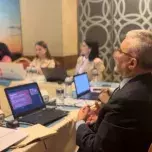Upon the request of the Conference of Parties (COP) at its thirteenth Meeting (COP13), the United Nations Convention to Combat Desertification (UNCCD) and partner institutions established the Drought Initiative. The Drought Initiative focused on three actions: working together at the regional level to reduce drought vulnerability and mitigate impacts; providing a toolbox that stakeholders can use to boost the drought resilience of both people and ecosystems; setting up drought preparedness system, particularly national drought plans. Following up on the decision, UNCCD has been supporting the development of comprehensive national drought plans. The “Enabling Activities for Implementing UNCCD COP Drought Decisions” project, funded by the Global Environment Facility (GEF) and jointly implemented by FAO and UNCCD, is currently running to support the operationalization of national drought plans according to the principles of integrated drought management.
Within the framework of the project, FAO and the Imperial College of London organized a global workshop between 18 and 20 June 2024 to enhance capacities of selected UNCCD country parties and institutional frameworks in conducting drought impact and vulnerability assessment, monitoring, and reporting and promote harmonized approaches for preparedness.
To foster a shift towards proactive drought management, FAO conducted a thorough review of the endorsed national drought plans during the first phase of the project. From the analysis, a need emerged for the definition of a global methodology on drought impact, and vulnerability assessment to move forward in the operationalization of national drought plans.
The global workshop responds to this objective and supports planning and implementation of national drought plans by enhancing knowledge and capacities in the application of advanced and comprehensive methodologies for impact and vulnerability assessment and their inclusion into national strategies for integrated drought management.
To achieve this goal, the workshop will be organized along different sessions with the objective to:
- Provide guidance, tools, and approaches for assessing and monitoring the resilience of vulnerable populations and ecosystems to drought, with a specific focus on integrating gender considerations.
- Map out existing methodologies and showcase country-level best practices for impact and vulnerability assessments along the multiple dimensions of drought.
- Define a comprehensive set of databases, including methodologies, metrics, and indicators, and discuss its application for enhanced drought preparedness.
- Collect and analyze global impact indicators aligned with UNCCD strategic objectives to reduce ecosystems’ vulnerability to drought and enhance resilience.
- Ensure the inclusion of gender considerations in all aspects of drought impact and vulnerability assessment processes, from data collection to analysis and reporting, to address gender-specific vulnerabilities and enhance gender equality in drought resilience efforts.

